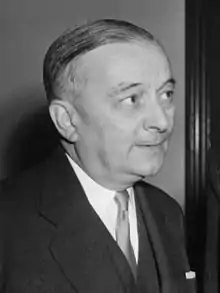June 1946 French legislative election
Legislative elections were held in France on 2 June 1946 to elect the second post-war Constituent Assembly designated to prepare a new constitution. The ballot system used was proportional representation.
| ||||||||||||||||||||||||||||||||||||||||||||||||||||||||||||||||||||
All 586 seats to the French National Assembly 294 seats were needed for a majority | ||||||||||||||||||||||||||||||||||||||||||||||||||||||||||||||||||||
|---|---|---|---|---|---|---|---|---|---|---|---|---|---|---|---|---|---|---|---|---|---|---|---|---|---|---|---|---|---|---|---|---|---|---|---|---|---|---|---|---|---|---|---|---|---|---|---|---|---|---|---|---|---|---|---|---|---|---|---|---|---|---|---|---|---|---|---|---|
| Turnout | 81.85% ( | |||||||||||||||||||||||||||||||||||||||||||||||||||||||||||||||||||
| ||||||||||||||||||||||||||||||||||||||||||||||||||||||||||||||||||||
 PCF 153, SFIO 129, RGR 52, Mod. 78, MRP 166, Misc. 9 | ||||||||||||||||||||||||||||||||||||||||||||||||||||||||||||||||||||
| ||||||||||||||||||||||||||||||||||||||||||||||||||||||||||||||||||||
After the liberation of France in the Second World War, three parties dominated the political scene due to their participation in the Resistance to the German occupation: the French Communist Party (PCF), the French Section of the Workers' International (SFIO, socialist party) and the Popular Republican Movement (MRP) Christian democratic party. They formed a provisional government led by General Charles de Gaulle.
General de Gaulle advocated a strong presidential government. He felt that the "regime of the parties" under the French Third Republic's system of parliamentary government (characterised by its political instability and ever-changing coalitions) was a cause of the 1940 collapse. However, the three main parties considered parliamentary democracy to be inseparable from the ideology of French republicanism. To them, de Gaulle's project appeared to be a rebirth of Bonapartism. In January 1946, de Gaulle resigned from the Cabinet.
The socialist Félix Gouin succeeded him. A first constitutional draft was approved by the National Assembly. It was supported by the Communists and the Socialists. It concentrated power in a unicameral Assembly and abolished the Senate of France. The Christian-Democrats campaigned for the "No" with de Gaulle and the opponents to a constitutional change (the classical Right and the Rally of the Republican Lefts dominated by the Radical Party).
The "No" coalition warned the voters against the danger of a "dictatorship" of an Assembly dominated by the Marxists, which could question the existence of private property. In the "Yes" coalition, the SFIO refused the Communist proposition of a common campaign. Finally, the "No"s won by 53% of the votes (May 1946 French constitutional referendum).
Consequently, a new National Assembly was elected in order to elaborate a new constitutional draft. The MRP, which led the "No" coalition, became the largest party with more votes and seats than the PCF. The Communists and the Socialists no longer formed a majority, so the MRP was a necessary partner for the writing of a constitutional text. Its leader Georges Bidault took the lead role in the provisional government.
Results
| Parties and coalitions | Abbr. | Votes | % | Seats | |
|---|---|---|---|---|---|
| Popular Republican Movement (Mouvement républicain populaire) | MRP | 5,589,213 | 28.22 | 166 | |
| French Communist Party (Parti communiste français) | PCF | 5,145,325 | 25.98 | 153 | |
| French Section of the Workers International (Section française de l'Internationale ouvrière) | SFIO | 4,187,747 | 21.14 | 128 | |
| Total "Three-parties alliance" | 14,922,285 | 75.34 | 447 | ||
| Moderates (Right-wing and UDMA) (Modérés) | PRL/CNI | 2,538,167 | 12.82 | 78 | |
| Rally of the Republican Lefts (Rassemblement des gauches républicaines) | RGR | 2,299,963 | 11.61 | 52 | |
| Miscellaneous | 44,915 | 0.23 | 9 | ||
| Total | 20,215,200 | 100 | 586 | ||
| Abstention: 18.15% | |||||
Parliamentary Groups



.png.webp)
.svg.png.webp)